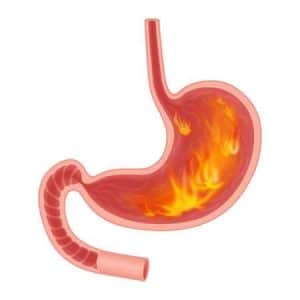Acupuncture for Digestive Disorders
 Digestive disorders are prevalent conditions. The most common digestive disorders include nausea, constipation, diarrhea, reflux, irritable bowel syndrome, and even gall stone disease and hemorrhoids. According to the National Health Interview Survey, digestive disorders affect 60-70 million Americans.[1]
Digestive disorders are prevalent conditions. The most common digestive disorders include nausea, constipation, diarrhea, reflux, irritable bowel syndrome, and even gall stone disease and hemorrhoids. According to the National Health Interview Survey, digestive disorders affect 60-70 million Americans.[1]
In traditional Chinese medical theory, the two main organs involved with digestion are the spleen and stomach. The spleen is the main organ involved in gastro-intestinal disorders. Spleen governs transport and transformation of food in the body, including the excretion of waste. Spleen-Stomach transforms food into nutrients, which are the sources of Qi (energy) and blood. If there is an imbalance in the spleen or stomach, then a huge variety of associated problems can arise ranging from pain, to chronic fatigue, anxiety to insomnia.[2]
According to TCM theory, the four most common reasons that gastro-intestinal problems arise:
- Spleen Qi Deficiency, which is caused by chronic fatigue or chronic illness;
- Damp Heat Retention, which is caused by improper diet, environmental factors, or infections;
- Disharmony of Liver and Spleen, which is caused by emotional disturbance;
- Spleen and Kidney Yang Deficiency, which is caused by chronic illness or aging.
Acupuncture effectively treats these problems by balancing Yin and Yang, harmonizing Qi and Blood, nourishing the organs, and eliminating Damp Heat in the body. These techniques are described in Huaungdi Neijing (The Emperor’s Classic of Internal Medicine), a Chinese medical classic text book written thousands of years ago.
Many modern clinical studies also show that acupuncture alters various biochemical and physiological states to treat a wide variety of illnesses. Research shows that acupuncture directly affects gastrointestinal motility and restores stomach acidity to normal levels.[3] Experiments with dogs demonstrates that acupuncture reduces serum levels of serotonin (5-HT), which can impact the symptoms of Irritable Bowel Syndrome (IBS). Clinic trials show that acupuncture treatments could remarkably improve the clinical condition and health-related quality of life (QoL) in IBS patients.[5]
There are numerous data that acupuncture could provide significant therapeutic benefits in patients with gastrointestinal disorders. Acupuncture implements a holistic approach, with the aim of naturally promoting health without side effects and alleviating sickness by restoring the energetic balance of the body systems.
References
- Adams PF, Hendershot GE, Marano MA. Current estimates from the National Health Interview Survey, 1996. National Center for Health Statistics. Vital Health Stat. 1999;10(200).
- Xie-Ning Wu Current concept of Spleen-Stomach theory and Spleen deficiency syndrome in TCM World J Gastroenterol. 1998 Feb 15; 4(1): 2–6. PMCID: PMC4767755
- Yuan CX, Li PM, Zhu J, et al. Clinical value and mechanisms of the action of the acupuncture points “Pishu” and “Weishu”. Chinese Acupuncture1985;4:5–8.
- Zhou L, Liu LG, Chen HL, et al. The effect of acupuncture “Renzhong” on gastric motility and its relation to peripheral 5-hydroxytryptamine. Chen Tsu Yen Chiu 1987;2:137–8. [PubMed]
- Guan-Qun Chao, Shuo Zhang Effectiveness of acupuncture to treat irritable bowel syndrome: A meta-analysis World J Gastroenterol 2014 February 21; 20(7): 1871-1877